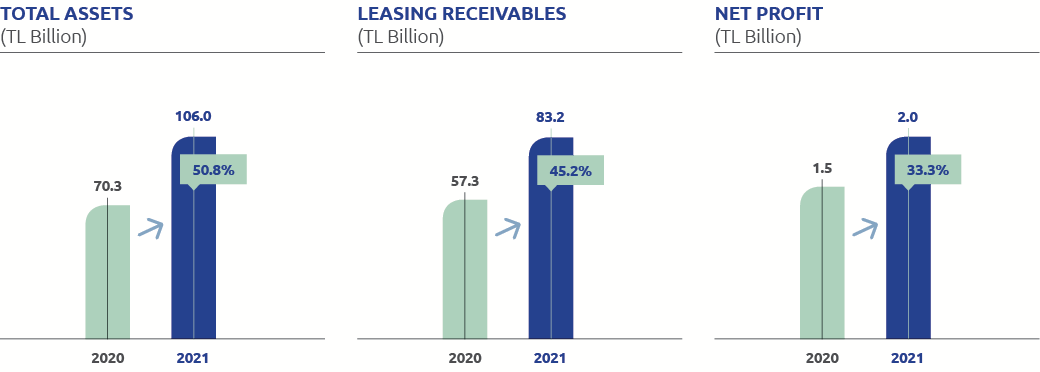Growth trend in the sector

Total transaction volume of the sector in which 22 leasing companies operated as at year-end 2021 was up by 21% to USD 3,990 million.
The leasing sector, which provides the financing of investment goods, holds a quite important position in the non-banking finance segment with its structure enabling it to offer long-term, flexible repayment plans aligned with cash flows, and is affected by fixed investment amounts that vary according to the course of the economy.
Having quickly adjusted to the pandemic circumstances and having held an optimistic outlook at the onset of 2021, the leasing sector kept growing in 2021; this tendency became more pronounced from the third quarter as normalization steps gained momentum.
Total transaction volume of the sector in which 22 leasing companies operated as at year-end 2021 was up by 21% to USD 3,990 million. Having positively benefited from the economic conjuncture in terms of volume, the sector increased its leasing receivables to TL 83 billion and total assets to TL 106 billion.
Looking at the distribution of investments in the sector, heavy duty and construction machinery take the highest share with 23%, followed by other machinery and equipment with 13%, textile machinery with 12.0% and motor vehicles with 11%.
The share of renewable energy generation equipment went up to 5.3% in 2021. The rise is also linked to the incitement of the overseas lenders that predominantly provide funding to leasing companies for allocation of the funds to green finance (renewable energy in particular) and to the SMEs.
Although the ratio of financing of private sector fixed capital investments through leasing, which averages 4.5%-5.5% in Turkey, bounced back from the bottom value it has seen in 2019 and recaptured an upturn, it was still below its potential at 3.6% in September 2021. Given the high correlation between it has with the country’s growth, leasing transaction volume has the potential to grow in the existence of a stable growth path.
While the post-pandemic economic rebalancing and recuperation process influence the markets and new investments positively, the deteriorating effect of the extremely volatile exchange rates and depreciated Turkish lira upon inflation indicates that the national economy will slow down, and inflation will remain high in 2022. Coordinated policy moves aimed at preventing the interruption of the production and supply chain, protecting employment and continued healthy operation of the financial system are critical for the sector.
The period ahead presents opportunities for new customer acquisition as digital onboarding and electronic contract signing processes were introduced upon enforcement of regulatory arrangements; notwithstanding, the business volume will likely not increase in the light of the existing conjuncture given the fact that imported investment goods constitute a substantial portion of the sector’s transaction volume.
Targeting export-oriented companies in the event of improved investment environment, the sector anticipates to grow in renewable energy, mining, automotive, textile, chemicals, plastic and healthcare sectors. Based on all these assumptions, the leasing sector will possibly find opportunity for further growth with the expansion of its customer base.




